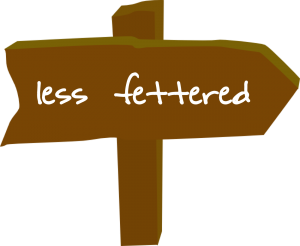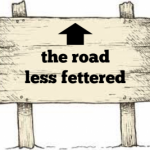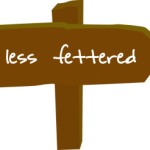 The Road Less Fettered has been traveled before by many wise and wonderful people. Below are six more of my favorite quotes that lead to unfettering.
The Road Less Fettered has been traveled before by many wise and wonderful people. Below are six more of my favorite quotes that lead to unfettering.
“What matters most is not the accomplishments you achieve; what matters most is the person you become.” — Dallas Willard
“Men weary as much of not doing the things they want to do as of doing the things they do not want to do.” — Eric Hoffer
“There are a hundred valid reasons why something can’t be done, but only one reason, Commitment, why it can.” — Jonathan Lockwood Huie
“Wisdom is the reward you get for a lifetime of listening when you’d have preferred to talk.” — Doug Larson
“It is not because life is difficult that we do not dare.
Life is difficult because we do not dare.” — Seneca
“A hero is no braver than an ordinary man, but he is brave five minutes longer.” — Ralph Waldo Emerson










{ 3 comments… read them below or add one }
the opposite of that. I am only opoespd to those writers who mangle language to produce obscurantist pieces which are then passed off as deep.Shakespeare is remembered not as a populist (where did you get this idea?) but as a wordsmith.Where did I get this idea? Oh, I don’t know, when I studied Shakespeare? I never claimed that he was remembered as a populist I just remarked that in his own time, people like you would probably have accused him of being one. You do know that his reputation as the greatest playwright and poet of all time developed later, right? In his own time, he was considered good, but others were generally considered better. And his plays were popular plays, enjoyed by and produced for a wide audience.Indeed, Shakespeare is the father of modern English more than any one person not named Samuel Johnson, who was its standardizer. He cycled through a vocabulary of over 30 thousand words,Oh dear, you don’ think you’re impressing me with your knowledge, are you? I could’ve told you the same when I was 15.whereas Ms. Rowling is dealing with her paltry three or four and the many more on the first few lines in the thesaurusIs it a numbers game, then?(I find it hilarious how the diction is bumblingly elevated at about the fourth book and steadily so, without fixing the grammatical and syntactical foibles that first made it insufferable, like Rowling’s insistence that there is no difference between the simple past and the subjunctive, which is baffling to me, or the objective or subjective case, which seems an even more glaring elision).Oh no! A writer writing in their own way and not following your rules!for foreign mindNot sure what this is supposed to mean, but let’s go on (I know, it must be difficult for you, what with your meager diet of Gaiman and Rowling)Once again, you’re revealing just how hollow your arguments are, by assuming that I read or enjoy Gaiman. You don’t know this. In fact, you know nothing about my reading habits at all, though you could probably have found out something by reading this blog. You’re just randomly applying your prejudices, assuming I fall into some generic geek cliche9.Nikolai Gogol and Leo TolstoyI read and enjoyed Gogol primarily the short stories when I was 18 or so. I haven’t read much Tolstoy, but I’ll get around to it. Did you know he hated Shakespeare?engaged with the problems of their age–problems like the workhouses in England, the conflict between England and Ireland, the poor and the wealthy, and so on–and the ways in which they sketched the most vivid characters, like Dickens’s fearsome Ms. Havisham or the decidedly immodest Uriah Heep; let’s talk about Don Quixote and Sancho Panza; let’s talk about Gargantua and Pantagruel. But let’s not stop there! Let’s speak of Faulkner, who was infamously difficult, and the internal monologues that he wove, the narratives that he built out of the thoughts of his characters–and the vividness with which he drew his now mythic Yoknapatawpha County and its inhabitants, from the pernicious Snopes to the hapless Bundrens and Compsons. Where in anything written by either Ms. Rowling or Mr. King is there a passage of such throbbing beauty and lucidity as the two chapters in which the presumably dead Addie recounts her life?In the works of both King and Rowling, there are many such passages, which you with your arrogance cannot see and will never see, because you have no love of art, only of the status of art. And name-dropping. Oh, you do love your name-dropping, don’t you, even when it adds nothing to the argument save for illustrating your unspeakable amounts of knowledge? Just like every bad academic.As a matter of fact, King and Rowling engage the topics of their time more than most modern or postmodern writers, whose idea of what the important topics are mostly consists of the pathetic psychological problems of white middle-class university professors. But you wouldn’t know that, because you have either not read their work, or read it to hate it, which amounts to the same. You don’t know about King’s evocation of the rise of dictatorship in modern America in Under the Dome , or his vivid and heartbreaking characters in The Dark Tower (with its many intertextual references, and the way it uses intertextuality not to impress critics but to tell a story), or his exploration of painting, friendship and fatherhood in Duma Key . In other words, you’re talking our of your arse.But of course you know little of this because you know nothing of the history of the novel, a term which you cheapen terribly by invoking either Ms. Rowling or Mr. King, both of whom are a disgrace to the form and offer nothing at all ‘novel.’Of course I don’t! I spent the last seven years studying English and American philology for nothing! I am just another nerd who makes games and must therefore be illiterate and stupid.The only disgrace to the form is readers like you.But the fact that you so gleefully misrepresent Bloom’s viewsDo I? Please explain. Because I’m pretty much basing myself on his own writings.(and it’s all right–you don’t know any better)Of course I don’t. Thank you for your condescension, all-knowing wise one.the way you belittle at will the significance of the novel by even thinking that Harry Potter is anything like any of the works of the authors I’ve named–with that one can hardly agree, and that’s because it’s plainly absurdPlainly.But of course now you will simply seize on the time in which these authors wrote and say that I’m just a nostalgic idiot.Why have I read and enjoyed so many of them, then? and who won the Nobel Prize.Because that’s significant?Where is the Dylar in Ms. Rowling’s writing? It’s non-existent, of course; the only symbolism she cares for–the layers of meaning of which you speak, I presume–is the heavy-handed and obvious sort, to which there is no mystery and from which one draws not the slightest degree of edification.Well, I happen to believe that a novel can have more depth than simply having symbolism it can have political, philosophical and aesthetic levels that have nothing to do with symbols. Though I do like Rowling’s symbolism, the few times that she uses it. I don’t see how it is heavy-handed, but it’s your right to think so. (It’s the cliche9 thing to say, of course, but you seem to love cliche9s.)Beyond that, how about Cormac McCarthy, whose prose is the most starkly original and shamelessly lyrical American letters has seen perhaps since Faulkner?I have very little interest in his work, but perhaps some day I’ll give him another chance. I like how you seem to think that these fashionable writers are somehow challenging and known only to intellectuals, though.If you want some true lyrical beauty, read Peter S. Beagle.More to the point, how about Jonathan Franzen, who strikes a perfect tragicomic novel in his withering portrait of suburban America and the failures of the American family across generations to right one another’s mistakes in “The Corrections”?You seem to believe that this is an important subject matter. I think it’s trivial navel-gazing.Or what may perhaps be the greatest Vietnam novel ever written, “Tree of Smoke” by Denis Johnson (published just two years ago!). How about “Snow” by Orhan Pamuk, also a Nobel Prize winner, which hearkens back both Kafka and Dostoyevsky, which holds up to the rest of the world the enduring travails of an entire people and which addresses head on the matter of terrorism?Look, if you want to impress me with your name-dropping, you better drop some names that aren’t in the Fashionable Modern Writers For Beginners bucket. Try Sam Selvon, or Zadie Smith, or Drew Hayden Taylor, or Thomas King. But I guess you wouldn’t know who these people are, because they don’t fall into your conventient little mainstream of pretentiousness.Reading is supposed to produce aesthetic pleasureYes.it’s supposed to be difficult;No. Why? you’re supposed to invest yourself in it.So the only way for you to invest yourself in a text is for it to be difficult? I’m very sorry for you. Not that all writing needs to be easy, but its formal complexity must be artistically justified. Usually it isn’t, and is nothing more than obfuscation to hide the shallow nature of the content.You are not a reader in that sense–what you want in your novels is all of the cliche9s, all of the situational-comedy comebacks and tropes that you see on television.My God, you’re hilarious. Now it’s television. Are you going through a checklist of snobbish intellectual cliche9s?Do you seriously believe that I read Blake, or Chesterton’s theological work, or E.R. Eddison, or Sam Selvon, to get the same experience I would from a bad sitcom? (I’m assuming you don’t believe such a thing as good situational comedy exists.)What you want the novel to be is an echo chamber for the utter insipidness of your own life, completely devoid of anything even remotely pioneering, with no stylistic advancements, no desire to test the boundaries of anything, no intertextuality and no context in any tradition other than that of maudlin tripe and the mighty penny dreadful.Ah, now you’re really starting to sound like Bloom himself. The penny dreadful what century is this? This is doubly funny, given that you clearly have no idea who you’re talking to and what my work is about.Given which, it’s natural you should call Harry Potter one of the greatest novels of our time. But be assured they are nowhere near that, and may in fact be among the worst.Wow, you must have read very few novels to make an assertion like that.
I’m imsrdpsee. You’ve really raised the bar with that.
There’s a secret about your post. ICTYBTIHTKY